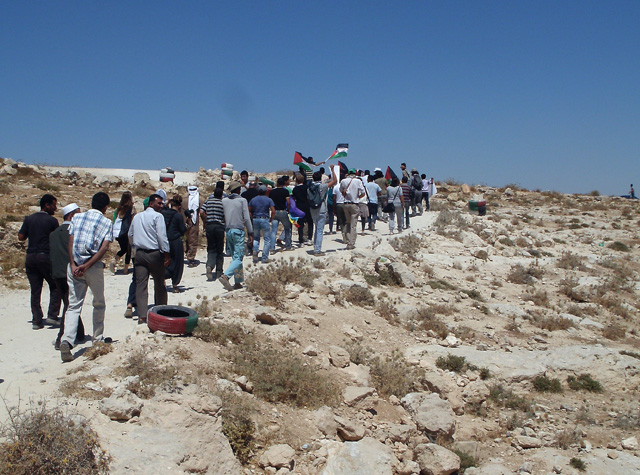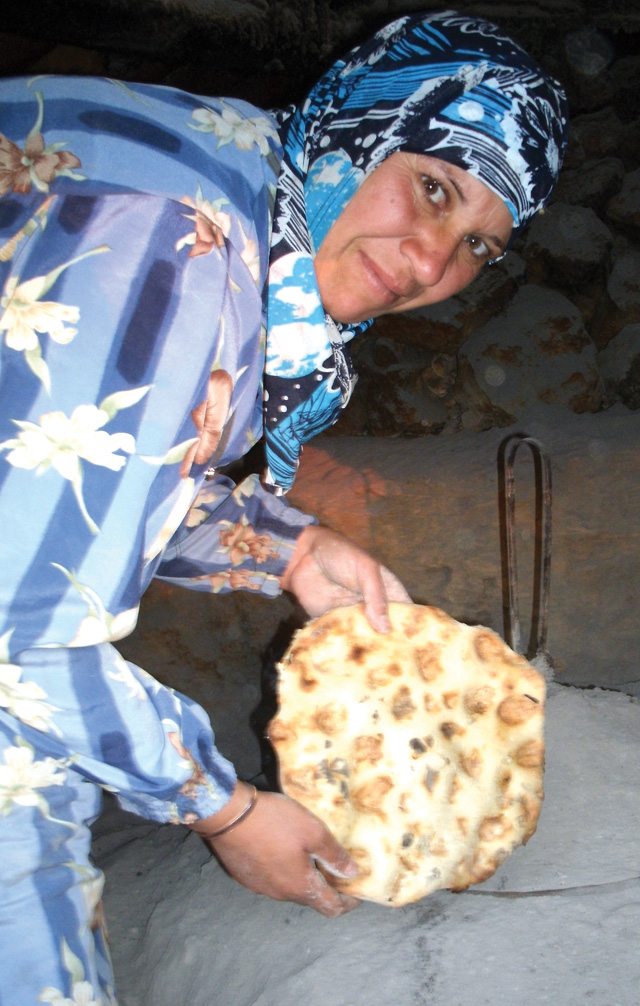The scent of bread
By Sr. Rosemary Williamson
May/June 2013
Return to Table of Contents
Print Article
These few lines of Mahmud Darwish, a beloved Palestinian poet, express so well my feelings about Palestinians and their country. Their gracious welcome, deep love and attachment to the land, and yes the delicious bread they bake and share so readily. In particular I remember waking in the village of Susiya after spending the night in one of the village tents along with other Christian Peacemaker Teams (CPT) members. There was a beautiful sunrise colouring the sky and already one of the women was busy baking the morning bread.
Despite the fact that Susiya, like many Palestinian villages in Area C, existed prior to 1948 and prior to Israel, they are now under threat of demolition because the Israeli government has declared this area a Firing Zone for military training. It is home to 1,800 people living in 12 villages.
In August 2012 when I was last there, we were invited to participate in a nonviolent action beginning in the village of Mfagera. It was on the very day when the Jewish court was to announce its decision regarding its responsibility in the death of Rachel Corrie. She was the young American woman who was killed by a bulldozer while resisting home demolitions in Gaza.
Gathered that day in Mfagera were villagers living nearby and a group of young people from Ramallah who brought posters of Rachel Corrie. Also present were Israeli supporters and internationals. We learned that demolitions had taken place earlier that morning in Susiya. As we made our way up the road we could see a military jeep monitoring our progress. Finally the jeep drew near the gates of the Jewish settlement of Abigale, where a large number of soldiers were stationed. Demonstrators placed their placards on the windshield of the vehicle, slowing down its progress. Various local leaders gave speeches and the protest concluded peacefully.
I saw a country embrace me with morning hands.
Be worthy of the scent of bread.
Be fit for summer flowers.
Your mother’s brick oven is still blazing.
Her greeting is still warm
like the loaf she bakes.
These villagers of the South Hebron Hills have suffered from demolition of their dwellings, periodic attacks from settlers, killing of their livestock, and blockades of their roads, but they remain steadfast in their determination to remain on their land. As one villager expressed it, “I was born in this area; home is like a symbol of life, your values, your identity.” They have grown in their ability to organize and resist nonviolently, but it is an ongoing struggle. In late December these villagers were given a 30-day reprieve from the occupying power’s plan to evict them and make the area a bombing range.
 Villagers of the South Hebron Hills take part in a nonviolent action, walking to the gates of a Jewish settlement where soldiers are stationed. August 2012.
Villagers of the South Hebron Hills take part in a nonviolent action, walking to the gates of a Jewish settlement where soldiers are stationed. August 2012.
Yet hope persists, like that claimed by Palestinian-American writer Ibtisam Barakat in her memoir, Tasting the Sky:
A Palestinian Childhood:
To Alef, the letter
that begins the alphabets
of both Arabic and Hebrew—
two Semitic languages,
sisters for centuries.
May we find the language
that takes us
to the only home there is—
one another’s hearts.
To find out more about the work of Christian Peacemaker Teams in Palestine, go to www.cpt.org/work/ palestine.
Return to Table of Contents
Print Article

